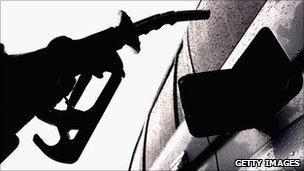Alcohol Concern questions petrol station drink sales
- Published

France introduced a ban on selling alcohol at petrol stations
Concern over drink-driving has led a charity to question whether alcohol should be sold in petrol stations.
Alcohol Concern Cymru has queried whether such sales are "in the best interest of all road users".
It pointed to France where a ban was introduced as a package of measures to reduce road deaths.
The charity said it recognised there were difficulties involved in introducing such a ban but alternative measures could be implemented.
It has released a briefing paper, external which aims to "stimulate wider public debate" about alcohol sales at petrol stations and garages.
Recommendations include drink-drive warnings being displayed at the point of sale at all petrol stations where alcohol is available.
Alcohol Concern Cymru policy manager Andrew Misell said: "Although the number of drink-driving accidents has substantially reduced over the last 20 years, as many as one in six deaths on roads in the UK are caused by drivers over the legal alcohol limit.
"In 2008, there were 5,183 positive or refused breath tests in Wales.
"Petrol stations, by their very nature, are strongly associated with driving and attract significant trade from motorists.
"Of course, motorists have many opportunities to purchase alcohol from premises other than petrol stations, such as off-licences and supermarkets, but we need to think carefully about whether making alcohol available at petrol stations is in the best interest of all road users."
The charity said that in Wales and England, while the sale of alcohol is banned at motorway service stations, it is often sold legally at petrol stations and garages.
Local authorities may attempt to refuse alcohol licenses for such premises, but refusals were often overturned in the courts, it added.
Alcohol Concern's snapshot survey of petrol stations in eight counties in Wales in May this yearfound that 33% sold alcohol, a figure it said corresponded to previous research.
The survey also "highlighted that training for staff on selling alcohol was not consistent".
Clive Wolfendale, chief executive of drugs and alcohol charity CAIS and former Deputy Chief Constable of North Wales Police, said: "Drink driving is still one of the major causes of death on our roads.
"We should avoid placing before motorists even the temptation to consume alcohol behind the wheel."
'Healthier choices'
The Welsh Assembly Government said it supported the efforts of Alcohol Concern Cymru to raise awareness of drink-driving.
A spokesperson said: "However, the main levers to make the most significant change remains with the UK government through the power to legislate on price, licensing and advertising.
"As the Health Minister Edwina Hart has made clear, she will work with the UK government on this, but if it does not take action soon, she will seek the powers to act ourselves.
"The health minister wrote to the UK government stating our position, and the Health Secretary Andrew Lansley has responded and agreed the need to address the social and financial cost of excessive drinking, through tackling issues of supply and by helping people to make healthier choices about alcohol.
"He has committed to involve the assembly government fully in the development of alcohol policy."